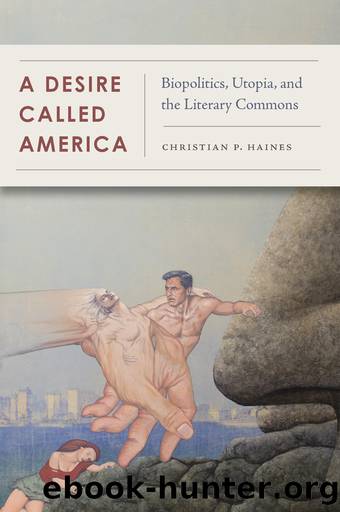A Desire Called America by Christian Haines;

Author:Christian Haines;
Language: eng
Format: epub
Publisher: Lightning Source Inc. (Tier 2)
Published: 2019-07-15T00:00:00+00:00
CHAPTER 4
Idle Power: The Riot, the Commune, and Capitalist Time in Thomas Pynchon’s Against the Day
In times like these, it’s easy to despair. The rise of Donald Trump to the U.S. presidency would seem to signify a turning back of the clock of political progress. The increasing regulation of national borders; intensified policing of immigrants; federal support for unchecked police violence, especially against persons of color and the poor; financial deregulation; a return to neoconservative hawkishness; the explicit promotion of white supremacism; the rolling back of hard-won protections for queer folks and women—these political pathologies speak to a dampening, if not a foreclosure, of social movements striving for another kind of America. Occupy, Black Lives Matter, and the struggle against the Dakota access pipeline have been eclipsed by a desperate sense that electoral politics are all we have, but not nearly enough. In short, radical politics seems to exist in the past tense, and left-wing melancholy has become the new political realism. At the same time, this interpretation of political reality in the United States ignores the persistence of a genuine utopianism in American culture and politics. Not only do mass feminist protests, teacher strikes, and marches against gun violence speak to a longing for a different America, they also bear the historical memory of social movements. They are placeholders, concrete traces, of an America beyond American exceptionalism. More generally, they speak the important truth that the so-called Trump era is less a coherent historical period than a political reaction whose shape depends on the riotous social energies that it opposes: Trump is a containment strategy, an attempt to hold at bay the social forces that challenge racism, heteronormativity, misogyny, and class power. That such containment involves a parasitic dependence on its opposite can be seen not only in Trump’s paranoid obsession with leftist politics but also in the way that his rallies constitute garish imitations of mass protest. Trump is a farcical repetition of revolution, clowning around with the idea of social change—“Make America Great Again”—only to maintain the status quo of neoliberal capitalism. His buffoonery betrays the survival of a singular America in excess of even the most virulent exceptionalism.
In times like these, reading Thomas Pynchon’s 2006 novel Against the Day is a lesson in recovering the powers of social change that have been submerged by political reaction. Against the neoliberal view of America as a gigantic corporation, Pynchon suggests that America bursts with a political militance at odds with entrepreneurship. Since at least Gravity’s Rainbow (1973), Pynchon’s fiction has cultivated a sense of political hope that rests on the persistence of counter-national elements in the midst of the most vicious crackdowns on left-wing politics and culture. Reading the so-called Trump era alongside Pynchon’s fiction demands a long-term perspective in which Trump symbolizes less a sudden swing toward fascism than the culmination of a long and deep fear of American utopianism—a climax, if not a conclusion, of exceptionalism’s quest to tame that desire called America. In the face
Download
This site does not store any files on its server. We only index and link to content provided by other sites. Please contact the content providers to delete copyright contents if any and email us, we'll remove relevant links or contents immediately.
| Anarchism | Communism & Socialism |
| Conservatism & Liberalism | Democracy |
| Fascism | Libertarianism |
| Nationalism | Radicalism |
| Utopian |
The Secret History by Donna Tartt(16606)
The Social Justice Warrior Handbook by Lisa De Pasquale(11485)
Thirteen Reasons Why by Jay Asher(7779)
This Is How You Lose Her by Junot Diaz(5753)
Weapons of Math Destruction by Cathy O'Neil(5027)
Zero to One by Peter Thiel(4816)
The Myth of the Strong Leader by Archie Brown(4785)
Promise Me, Dad by Joe Biden(4439)
Stone's Rules by Roger Stone(4412)
Beartown by Fredrik Backman(4403)
How Democracies Die by Steven Levitsky & Daniel Ziblatt(4392)
The Fire Next Time by James Baldwin(4336)
100 Deadly Skills by Clint Emerson(4070)
A Higher Loyalty: Truth, Lies, and Leadership by James Comey(4024)
Rise and Kill First by Ronen Bergman(4008)
The David Icke Guide to the Global Conspiracy (and how to end it) by David Icke(3875)
The Farm by Tom Rob Smith(3869)
Secrecy World by Jake Bernstein(3773)
The Doomsday Machine by Daniel Ellsberg(3725)
